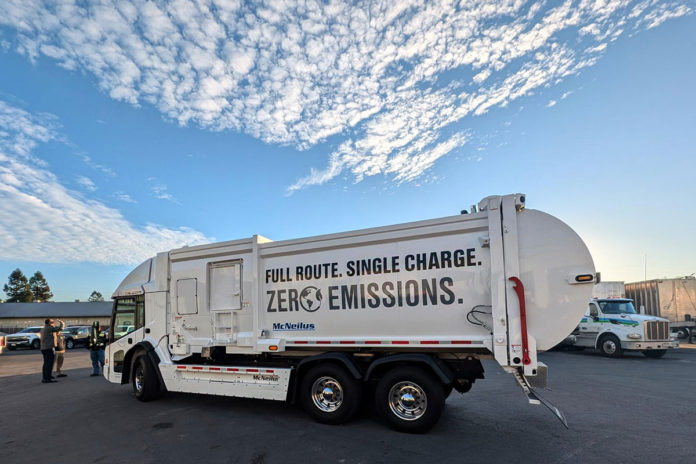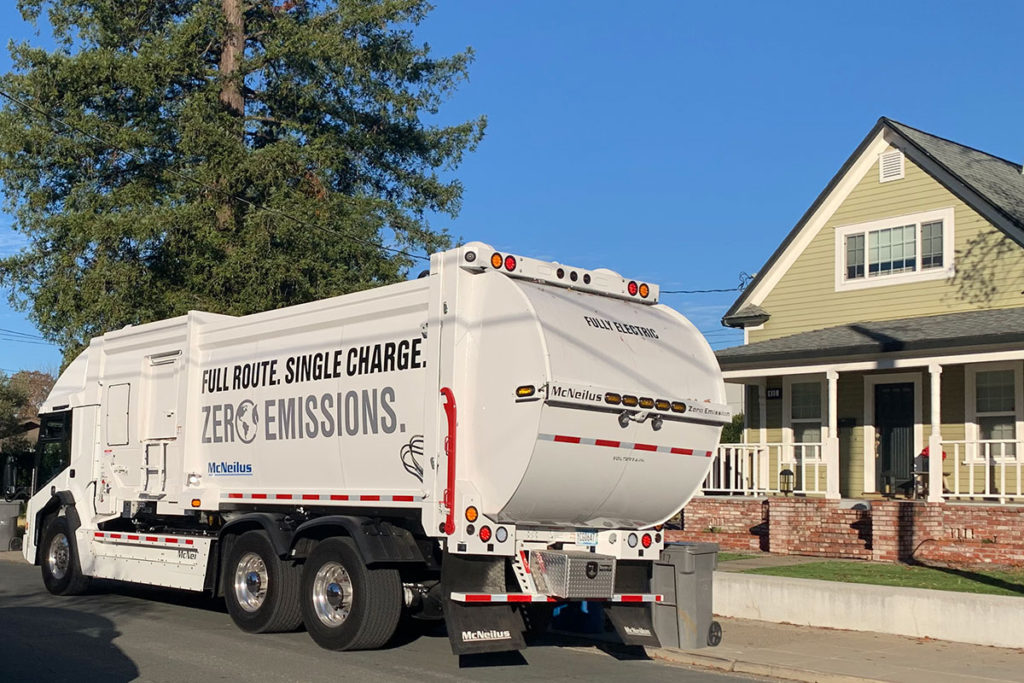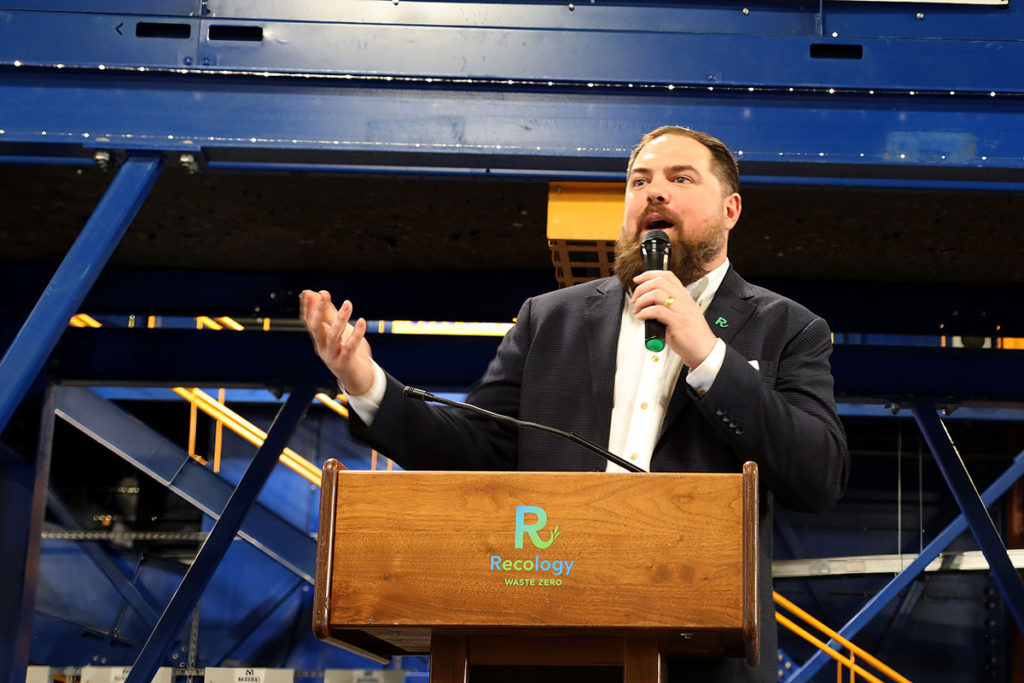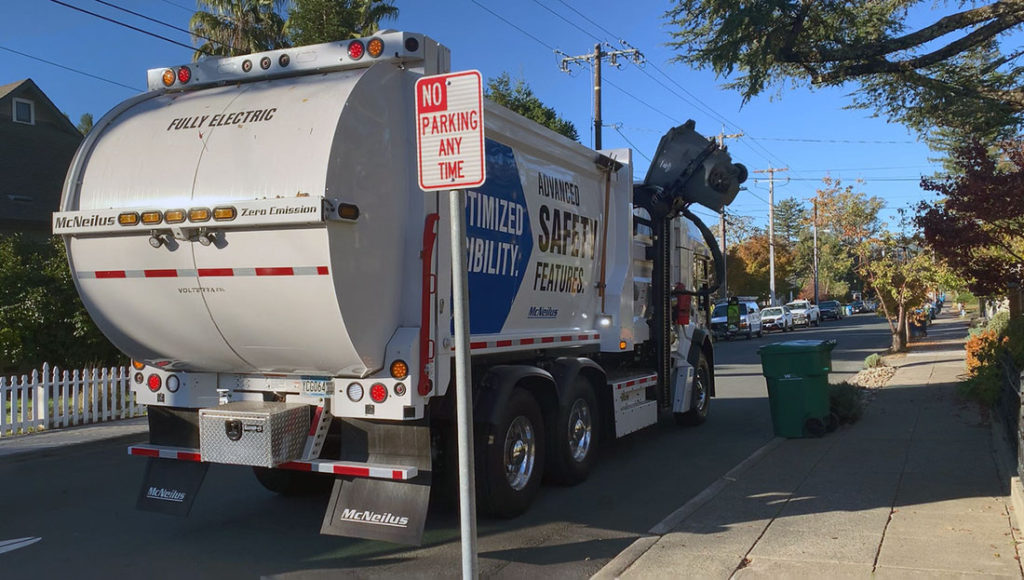
Early risers on Dec. 3 may have heard an unfamiliar sound outside their homes: A strange whirring noise, not loud, interrupted by the crash and clatter of garbage cans being emptied and replaced to the curb.
The crash and clatter were familiar, but not the whir and whine of the garbage truck itself. In fact, the noise the truck made was more familiar to owners of Prius’ and other EVs. The truck was a McNeilus side-load electric vehicle, or EV. Tracking its progress were City of Healdsburg Public Works engineers, evaluating the future of all-electric garbage trucks for everyday waste hauling.
It was the second time a Recology EV truck had run its rounds in Healdsburg, according to Public Works Director Larry Zimmer. “The truck was driven from Santa Rosa, completed more than half of a normal route, and returned to Santa Rosa with 52% battery remaining,” he said. “Recology will continue testing the truck and researching battery performance over time.”

Indeed, that’s the point. “We regularly have routes that are running 12 hours from start to finish, where drivers are on the road for 12 hours, sometimes longer,” said Logan Harvey, senior general manager of Recology Sonoma-Marin.
“Basically we have to contend with 1,200 pickups and a thousand homes in these routes,” Harvey said. “We’re trying to determine if EV technology is capable of running that route.”
Said the ever-cautious Zimmer, “The initial results are promising and exciting, but there’s still more to learn about long-term performance and feasibility. Even if the truck continues to perform well, it’s unclear when these vehicles might be deployed in Healdsburg.”
Sonoma Connection
David Hagele, still mayor of Healdsburg for the month of December, was likewise enthused about the future of EV garbage trucks. “I’m excited about everything we can learn from Recology deploying an electric garbage truck in Healdsburg,” he said. “There’s a lot of good data related to the range for the truck, as well as the charging infrastructure needs/location to accommodate larger commercial EV’s locally.”
Harvey, himself a former Sonoma City Council member, resigned to move to Seattle in 2011, where he became government relations manager of Recology King County. He returned to Sonoma County last year with a promotion to Recology Sonoma Marin general manager.
Converting Recology’s local pick-up fleet from gasoline or diesel to all-electric is mandated by state law, and overseen by the California Air Resources Board (CARB).
“CARB has an incoming requirement that the Recology fleet, and all heavy-duty fleets, are [to be] 100% zero-emission vehicles, I believe it’s by 2042,” Harvey said.
“On the path to that, there are certain targets that we’re required to hit. So we’re looking at different technology, whether it’s electric or hydrogen—they are kind of the main players, because eventually diesel and natural-gas trucks are going to be required to be phased out,” he added.
Recology had the first-in-the-nation EV garbage trucks, in use in Seattle (King County) several years ago. At first they were just rear-loaders, but now side-loaders—such as those seen in Healdsburg earlier this month—are in use as well.
Front-loaders, which pick up the large collection containers used in commercial accounts, are still some time away, as the technology to operate front-loaders is still in development. “Right now it’s more the residential side-load collection trucks that you see like in your neighborhoods,” Harvey said.

Obstacles
Despite CARB’s requirements, there’s no clear throughline from the current fleet of gas- or diesel-fueled trucks to a universal EV fleet. One hurdle is money.
“Right now, give or take, a diesel or natural-gas collection vehicle will run us around $475,000,” Harvey said. All-electric trucks are currently at least twice that, $1.2 million or more. Diesel trucks are also more efficient—a full day’s route of 10-12 hours can be accomplished with an EV truck, but its “fuel” (charge) efficiency drops the heavier the load is; a fully loaded garbage truck can haul more than 10 tons of yard waste.
“Those trucks can run a 10-hour route very successfully, [but] when it gets heavy or it has to haul long distance to a yard, then you start to have a lot of battery loss,” Harvey said.
“So we’d have to get one-and-a-half EV trucks to replace a diesel,” he added. That leads to the next hurdle: community buy-in.
“The technology is always evolving,” Harvey said. “This is a conversation we’re going to be having with our communities as we are required to roll out and comply with these regulations—which direction we want to go, and how we’re able to pay for the higher expenses of these vehicles.”
He acknowledged, “That’s something that every community is going to have to start dealing with as we move forward to a more sustainable world.”










EVs for trash pick up? WTF? Are you guys out of your minds? $475,000.00? Who’s going to pay for this? Mandates? In my opinion, it’s BS. These trucks won’t last a full day and the costs? It’s another way for this state to control everything we do. Enough already. Newsom has destroyed California. Automakers can’t even sell what they have in EVs, no range, and the high cost of ownership.
I agree, Francois. Governor Newsom and the CARB need to be retired as soon as possible. Newsom and the members of the CARB need to take classes in physics, chemistry, and economics.
What isn’t mentioned in the article is the weight of the batteries for these EV garbage trucks. Recology trucks are already the heaviest vehicles going down residential streets. The weight is tough on the pavement. The batteries will add thousands of pounds to the weight of the truck.
Oh, and our garbage bills will double. Hope the electrical grid can handle all the extra power demand from charging up these EV Beasts.